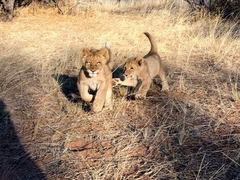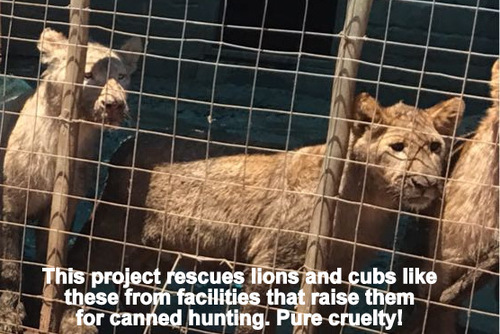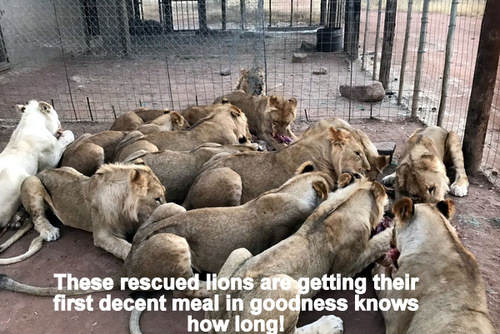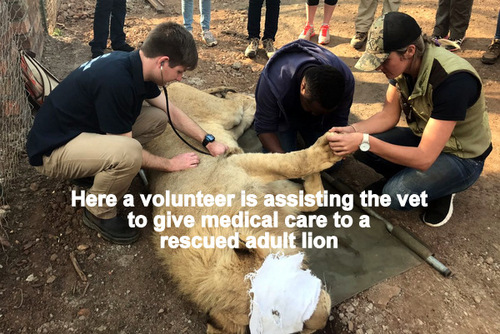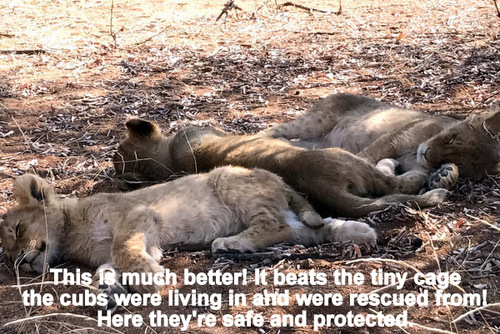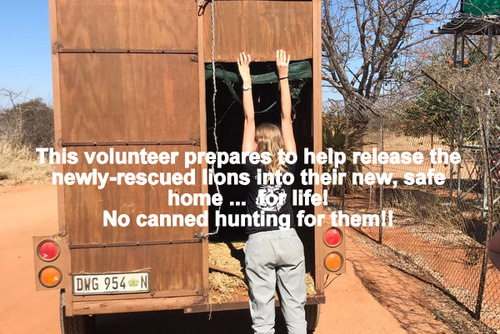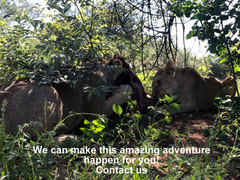This is a completely unique lion experience, with its end-goals of allowing rescued lions to live in a protected area. The project does not support or involve breeding or cub ‘petting’.
Your work will give you a variety of opportunities, including possible participation in game captures (which are hugely exciting!). You’ll also get involved in other conservation-related fields, including wildlife monitoring, game fence checks and animal behaviour monitoring.
Project Description and History:
Currently there 1000's of lions living in canned-hunting facilities throughout South Africa, which are predominantly stocked by the 'cub-petting' trade. Majority of these facilities are over-stocked, with lions living in cramped and horrendous conditions.
Working in conjunction with wildlife professionals and support from local authorities, the project has taken over a previous breeding and hunting facility, along with 90 lions that were living in dire conditions. Found starving and extremely thin, the initial priority has been to feed and allow the lions to get back to their optimal weight and health.
They are also erecting much larger enclosures and semi-wild enclosures (wild camps), which are enormous compared to what the lions have had to live in previously. The lions will be undergoing their rehabilitation in a safe sanctuary setting, with some of them starting out in smaller camps, to familiarise themselves with their new surroundings.
WORK DESCRIPTION:
The current focus on the project is to secure the lives of the rescued lions. Feeding alone requires over 500kg of food a day for the 90 lions, so you can imagine the amount of preparation and feeding schedules that this involves! Your time at the sanctuary is invaluable to the project and they desperately need your assistance with this mammoth task.
The next phase is the building and erection of the semi-free enclosures, which 0has already begun.
You’ll be involved with all of the rescued lions, assisting with feeding, cleaning enclosures and helping with the building of the new enclosures and camps.
When there are younger lions that have been rescued, they will be housed in smaller enclosures and reintroduced to the larger camps daily. You’ll be given training in how to practically assist and will work closely with the field-staff to really make a difference.
Other species that have also been rescued, and live in the sanctuary, include wolves, tigers, wild dogs, hyena, serval cats and many others as they regularly take in rescued wildlife.
Example of a Typical Daily Schedule:
Your work may include some or all of the following:
- Preparation of food and feeding lions and other animals
- Ensuring all animals have enough fresh water
- Cleaning out camps and enclosures
- Security checks of fences
- Sweeping the roads for foot prints. (The sand pathways around the reserve need to be swept in order for the anti-poaching patrols to notice any new footprints).
- Assisting with orphaned and injured wildlife. The project is a registered rehabilitation centre and often get brought orphaned and injured animals that require veterinary treatment and rehabilitation before being released back into the wild.
ACCOMMODATION:
You'll live on the Game Reserve in lodges, chalets and/or tented camps. They are all very comfortable and have electricity and running water.
The tents have wooden decks with an en-suite, open-air bathroom. There is no electricity at the camp, but it is lit by firelight and paraffin lamps in the evening, which amplifies the night atmosphere of being in the African bush.
Evening entertainment is usually based around board games, playing cards and socialising around the camp fire. The camps have a rustic charm which encourages an atmosphere of laid back relaxation....the way Africa was meant to be experienced!
Wi-Fi / Internet: There is no Wi-Fi available on site (apart from minimal Internet via cell phone), owing to its rural location.
FOOD:
While on the Reserves, all food is provided and sometimes volunteers prepare their own meals according to a set menu with ingredients and instructions provided. Some meals may even be prepared at different locations in the bush!


